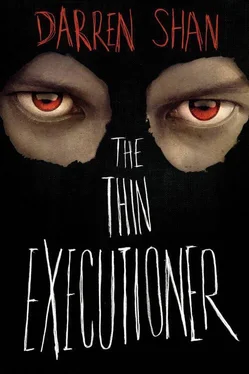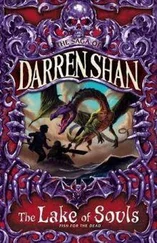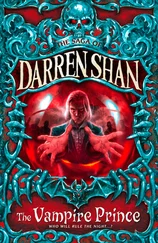The um Khathib lived in harmony with the alligators and snakes. Unlike the rest of the swamp’s human inhabitants, they chose not to fight the natural order but instead embraced it. Over many years they’d learned the ways of the fierce reptiles and formed a bond with them. It had been hard — many um Khathib had died — but they’d persevered and eventually come to be accepted by the animals. They helped the alligators and snakes find food, nursed their young, and patched up their wounds. Occasionally an irritated alligator bit someone, or a hungry snake made off with a baby, but such assaults were rare.
“I don’t understand,” Jebel said, biting into a strip of fishlike meat. “Why live here at all? Abu Nekhele is huge. There’s plenty of safe land elsewhere.”
“This our home,” Moharrag explained. “We part of swamp. We become animals when we die.”
“Do you know what he’s talking about?” Jebel asked Tel Hesani.
“I think so,” the slave answered. “Certain people believe that the world holds a limited number of spirits, which die and are reborn, some as humans, others as animals. The life you lead influences how you return. Good people come back as revered animals, while evil people return, for instance, as insects.”
“Nonsense,” Jebel snorted, but quietly, so as not to offend his hosts. “People can’t be reborn. We perish away to nothing or serve the gods in the heavens when we die.”
“So you believe, my lord. The um Khathib believe otherwise.”
“Does your god let the dead return to Makhras?” Jebel asked.
“No,” Tel Hesani said.
“Then you agree with me — it’s madness.”
Tel Hesani shrugged. “I do not mock the beliefs of others. This world is large enough for a thousand religions. Every race has the right to its own.”
“But don’t you want to correct them?” Jebel asked. “If you believe your god is the only god, don’t you want others to recognize that?”
“God doesn’t need my help,” Tel Hesani chuckled.
Jebel shook his head scornfully, then pointed at a snake wrapped around an um Khathib woman’s neck. “Maybe that’s your father!”
“Perhaps,” Tel Hesani smiled. “Or maybe it’s one of your relatives.”
“Take care, slave,” Jebel growled, and bit into another chunk of the fishy meat. But when Tel Hesani wasn’t looking, he cast a worried eye over the snake, just in case there were any family resemblances.
Jebel and Tel Hesani spent the next day resting in Khathib. The mosquitoes were less active there, and the um Khathib had oils and plant extracts to deter the flying pests. They smeared Jebel and Tel Hesani with the lotions and taught them how to search for replacements. They also showed them how to capture a rare type of fish. It left a foul taste in your mouth when you ate it, but the juices protected you from diseases spread by the mosquitoes.
Moharrag was interested in Jebel’s quest and asked lots of questions. The um Khathib believed that a great spirit lived in the al-Meata. They thought it took the form of a giant snake. Some of their ancestors had made quests north to ask the spirit for help. According to the legends, one of the successful questers founded this village and taught his people how to live in peace with the wildlife.
Jebel didn’t tell Moharrag that Tel Hesani was his slave or that he would be sacrificed in the bowels of Tubaygat. While it seemed perfectly natural to Jebel to own a slave and slice his throat open in pursuit of invincibility, he didn’t think the um Khathib would see it that way.
Tel Hesani could have happily spent a month in Khathib, learning about these strange people and their beliefs. But the quest took precedence. They’d lost time early in the trek, and if they didn’t make it up, they would run into difficulties farther along the path. The slave didn’t want to give the Wadi boy the opportunity to say that they had failed because the Um Kheshabah spent too long dawdling with snake-worshippers.
So the following morning Tel Hesani led Jebel out of Khathib. Moharrag offered to guide them. Jebel would have accepted the offer, but Tel Hesani knew that one of Moharrag’s wives was due to give birth soon. It was the custom of the um Khathib for the father to cut a newborn’s umbilical cord. It would have been unfair to ask Moharrag to miss his child’s birth, so Tel Hesani said they would find the path by themselves. Moharrag blessed them and prayed to his ancestors to grant the pair safe passage. Then he waved them on their way, and soon they were lost to the reeds and weeds of the swamp again.
The rest of the slog through the swamp passed without incident. Snakes continued to snap at the pair’s ankles, but none penetrated the thick leather of their boots or attacked while they were asleep. They didn’t stumble into an alligator’s den or fall into quicksand. Even the mosquitoes weren’t much of a problem, repulsed by the lotions of the um Khathib. Jebel’s eyelids healed and his hives subsided, though he was left with pockmarks on his face and arms. He didn’t mind — they made him appear more rugged, which would be attractive to the girls back home.
Jebel had hated the swamp to begin with, but now he started to see flashes of beauty as they cut through the reeds — the petals of a rare flower, the formations eels made underwater, the cries of birds at dawn and sunset. It was peaceful here.
He slept deeply at night, dreaming of Debbat Alg and how he’d kiss her when he returned, triumphant. He wondered what he would wear at their wedding and if he should choose J’Al or J’An to stand by him in the ceremony. He thought it would be nice to involve Bastina in some way, perhaps as a flower girl. Maybe that would stop her crying for once!
In a more relaxed and happy mood, Jebel paid attention now when Tel Hesani told him about different types of snakes and lizards, and even asked questions. One morning, watching Tel Hesani set a fire, he told the slave to teach him how to make one, and spent an hour learning the intricacies of building and maintaining a fire in the middle of a swamp.
“Did your father never teach you how to set a fire?” asked Tel Hesani.
“My father’s an executioner,” Jebel said archly. “He has no time for work such as this.”
“Still,” Tel Hesani murmured, “there are certain skills a father passes on to his sons — how to build a fire, how to whistle, how to shave…. These are pleasures for any man, be he the poorest or richest alive.”
“Maybe for the Um Kheshabah,” sniffed Jebel.
“If I may be so bold, master,” Tel Hesani said with genuine interest. “How much time did you spend with your father?”
“Quite a lot,” Jebel said. “He thought it was important for a father to spend time with his sons. He stayed in with us most nights, even though he would have been welcome in any house in Wadi.”
“You were close?” Tel Hesani pressed.
“Yes.” Jebel shrugged. “Obviously J’Al and J’An were closer because he was prouder of them, and they worked with him, but he never made me feel as if I was unwanted. He wrestled with me, the same as with the others, so that I could learn some of the rules of combat from him. He didn’t train with me as much as he did with my brothers, but he never excluded me.”
“Did he read to you or help you with schoolwork?”
Jebel leaned forward to adjust a twig on the fire. “That’s not how Um Aineh live. A man must behave like a warrior with his sons. Women educate their children. Men have more important matters to attend to.”
“Then did your mother read to—”
“She died when I was born,” Jebel cut in.
“My regrets.” Tel Hesani paused, then decided to carry on. This was the first time he’d had a real conversation with Jebel, and he was curious to know more about the boy who would take a knife to his throat some months further down the line. “Did your father have a second wife?”
Читать дальше







